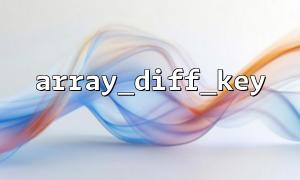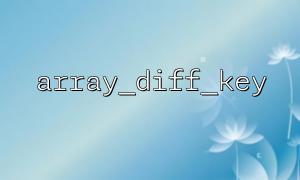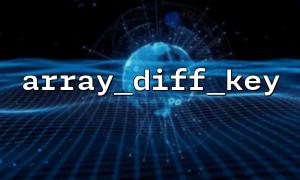In PHP, array_diff_key() is a commonly used array function that calculates the key differences between two or more arrays, returning keys that exist in the first array but do not exist in other arrays. However, many developers may be curious whether an object can be passed to the function as a parameter. Today, let’s discuss this issue in detail.
The array_diff_key() function takes two or more arrays as parameters and returns a new array containing keys that exist in the first array but do not exist in other arrays. The basic syntax is as follows:
array_diff_key(array $array1, array ...$arrays): array
For example:
$array1 = ['a' => 1, 'b' => 2, 'c' => 3];
$array2 = ['a' => 4, 'd' => 5];
$result = array_diff_key($array1, $array2);
print_r($result);
Output:
Array
(
[b] => 2
[c] => 3
)
In this example, the $result array contains the keys 'b' and 'c' in $array1 , because these keys do not exist in $array2 .
The function signature of array_diff_key() explicitly requires that the parameter be of array type ( array ). Therefore, passing the object directly as a parameter will cause an error. For example:
$obj1 = (object)['a' => 1, 'b' => 2];
$obj2 = (object)['a' => 4, 'd' => 5];
$result = array_diff_key($obj1, $obj2); // mistake!
This code throws an error because $obj1 and $obj2 are objects, not arrays.
Although we can't pass the object directly into array_diff_key() , we can solve this problem by converting the object into an array. PHP provides a variety of methods to implement object-to-array conversion, such as casting:
$obj1 = (object)['a' => 1, 'b' => 2];
$obj2 = (object)['a' => 4, 'd' => 5];
// Convert to an array
$array1 = (array)$obj1;
$array2 = (array)$obj2;
$result = array_diff_key($array1, $array2);
print_r($result);
Output:
Array
(
[b] => 2
)
Object properties : When you convert an object into an array, the object's public properties become keys to the array. If there are private or protected properties in the object, they become inaccessible. Therefore, array_diff_key() only applies to public attributes.
Object methods : array_diff_key() only cares about the keys of the array, so the object's methods (if any) will not be considered.
Object complexity : For complex objects (such as those containing nested objects or arrays), you may need to convert them recursively into arrays first.
array_diff_key() cannot directly accept objects as parameters because the function requires an array to be passed into.
If you want to use objects as parameters, you can convert the objects into an array and then use array_diff_key() to do so.
When converting, pay attention to whether the properties of the object meet your needs, especially when private or protected properties are involved.
In this way, you can use array_diff_key() with flexibility to handle differences between objects and arrays. Hope this article helps you!














